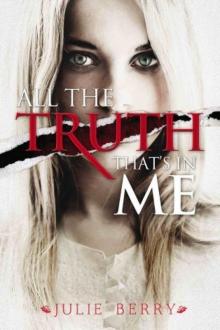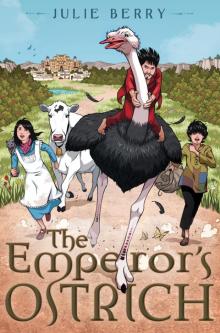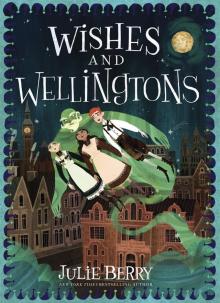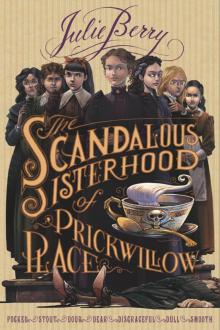- Home
- Julie Berry
Lovely War Page 8
Lovely War Read online
Page 8
For breakfast, I like a poached egg on toast, and an orange, when we can get them. They’re harder to come by nowadays. Were groceries as restricted in Chelmsford?
Ordinary life is fairly well summed up in Christmas choir rehearsals. There’s a great deal of singing to be done in the parish, and I’m the one they call. I don’t mind accompanying as much as soloing. I need a distraction. I’m not rehearsing audition pieces as I ought. I shouldn’t complain about piano when you’re sleeping in a tent, marching through mud, and waiting to head to the Front. But you’ve asked for normal life, so you shall have it.
Dad and Mum have gotten over being so upset with me for not telling them about you. I’m determined that you shall become acquainted. Do you have a photograph you could send?
My dad, as you know, plays piano in a music hall, and wishes he had more chances to go fishing. He’s crazy about chestnuts. My mum writes sentimental poems and keeps so many perfumed sachets in her bedroom drawers that just going in there makes my father cough. Her hands are rough from the thousand needle pricks one gets sewing shirts and trousers for a living. Every year I buy her a bottle of lotion for Christmas. Scented.
They’re both dears, and I adore them. They put me first always. It makes me all the worse a person for feeling so restless, for wishing to do something outrageous on my own for a change.
How about you? What would you name a dog? What do you prefer for breakfast? How do you feel about cats? Also, what’s the best book you’ve ever read? Where, if you could go anywhere in the world, would you plan a picnic? Tell me about your siblings. And about the most foolish thing you’ve ever done.
Yours,
Hazel
* * *
December 16, 1917
Dear Hazel,
Asking you to dance was the most foolish thing I’ve ever done. Look what it did to me.
I’d never call it great literature, but I enjoyed Tarzan of the Apes. And Kipling’s Jungle Book. In school, I was partial to Macbeth over Julius Caesar.
Pepper is a fine name for a dog. A second dog could be named Salt. As for cats, I have no objection, and Ginger and Nutmeg would do nicely. I draw the line at Mustard.
My siblings: Maggie is fifteen, still in school, and keen to become a typist. The typewriter noise gives our dad headaches. Maggie frets about her frizzy hair, but she’s just the girl you want around in a pinch. Bob, age thirteen, is wildly enthusiastic, and devoted, body and soul, to Boy Scouting. He spends every spare moment tracking around meadows and woods with a compass and field glasses. It’s good there aren’t wolves in Britain, or he’d be eaten by one.
I’d eat a picnic someplace wild and hot. The Congo, perhaps, or the Amazon rain forest. But perhaps that’s just a French December talking. If Congolese or Amazonian ants invaded the meal, they might eat the picnickers and not just the cold chicken.
My turn for questions: What’s your favorite book? Tell me about your friends, and your piano tutor. If you had a little cottage with a garden, what would you plant in it? And, if you were going to do something absolutely shocking and outrageous, what would it be?
Your letters bring more cheer than I can express. Don’t stop.
Yours,
James
* * *
December 23, 1917
Dear James,
Thank you for the photograph. My mother took quite a shine to it. Dad said, “Humph.”
Books: Evelina by Fanny Burney. North and South by Elizabeth Gaskell. Wuthering Heights by Emily Brontë.
My dearest friends are Georgia Fake and Olivia Jenkins. I went to school with them both, and we’ve been chums since we were small. They live here in Poplar. Georgia is quite hilarious, tough as nails, and smart as anything. She’s volunteering at a soldiers’ hospital here in London, with plans to become a trained nurse. Olivia’s just the opposite. Soft and tenderhearted. It’s odd that Georgia is the nurse and not she, for Olivia is so thoughtful and kind. She’d bring such comfort to the ill. Georgia, on the other hand, can keep a level head while someone’s arm is being sawn off. Perhaps she’s learned to be tough after a lifetime of people ragging her about her name, Fake. Olivia’s already engaged to a lad at the Front. It’s hard to comprehend. It seems only a moment ago that we were wearing our first fancy dresses to school teas.
My piano tutor is tyrannical and marvelous. Monsieur Guillaume. He’s in his sixties. He’s been my tutor since I was eleven, once I outgrew my first instructor. I know he loves me, as the best teachers love their pupils, and I love him. It makes it all the harder to sense his disappointment in me. I can’t ever live up to his hopes. The war has been terrible for him. To see France teeter on the brink of losing to the Huns has torn him apart.
In my cottage garden I would plant daffodils. Tulips in every color, and heavenly narcissus. And, when spring is gone, geraniums for cheer, and irises and lupines to sway in the breeze. Oh, now you’ve got me picturing it so clearly, and how can I be content if I don’t get my cottage garden someday? Such a spot would cost a mint in London. Even in Poplar.
My most outrageous scheme? I’ve already put it into motion. Soon after you left, I submitted my application to be an entertainment secretary in a YMCA relief hut in France. I shall play piano night and day for homesick soldiers. My parents are fit to be tied. They begged me to request a London hut, but I am determined to go where the soldiers are in greater need of diversion to get their minds off the war. I dread performing, but I can’t possibly fear it as much as soldiers dread the battlefield. I might as well divert the woes of actual soldiers as the woes of church ladies. I’ll be there soon after the first of the year. My parents are certain this will derail my path to conservatory. But if Europe is about to fall to the Germans, does that matter?
I’m sure you’re itching to finish your training, but I’m so glad you’re away from the German guns. Be safe and stay warm. Write and tell me about your comrades. And whether or not you enjoy fishing. It will mean a lot to Dad if you do.
Have a very happy Christmas. It breaks my heart to think of you spending it at a cold army base. May it be a festive one anyhow.
Yours affectionately,
Hazel
ACT TWO
APOLLO
“I Want to Be Ready”—January 3, 1918
JANUARY 3, 1918, two A.M. Thirty degrees below zero.
Aubrey Edwards and some forty other soldiers from the 15th New York huddled for warmth in straw strewn about the floor of a cattle car. They’d boarded the train in Brest, on the coast of France, an hour after disembarking from the USS Pocahontas, and now rattled, chuh-chuh-chuh-chuh, through the starlit dark over snow-covered countryside.
Cold, weary, and famished, they thought they were heading to the Front, and might see German combat by morning. Combat might have been better than where they were bound.
Locomotive wheels sang along the frigid metal rails. The rhythm was steady and would’ve been soothing, if the air weren’t so bitter, bitter cold. No whistles sounded and no horns blew. Even trains kept secrets during a war.
Harlem and home were so far away. Would he ever see his parents again? Taste his mother’s chicken pie? Smell the sweet tobacco of his father’s pipe? He’d give a lot to hear Kate squawk about him playing piano when her sleepy old boyfriend, Lester, came calling.
His father came home early from the paint factory, the day the Pocahontas sailed for France, to meet Aubrey at the docks and tell his only son goodbye.
“You conduct yourself with dignity and pride, young man, you hear me?” he’d said. “Nobody can take that away from you.”
Was that really true? Aubrey remembered Spartanburg. Hadn’t those vicious shopkeepers and farmers worked like the devil to do exactly that?
“And stay alert,” his father continued. “Anything can happen in a war, but it’s less likely to happen t
o the man who keeps his eyes open.” He held out his arms wide and crushed Aubrey in a hug. “Whip those Germans and hurry back to us.” Aubrey could still feel his dad’s whiskers and smell the chemical-clean scent of paint in his father’s collar.
He pulled his hands from his pockets and blew on them. His breath turned to ice before it could do any good. He shoved them under his shirt. A pianist couldn’t risk his hands.
Was he even a pianist anymore? Everyone else in the band could pack their instrument in a case and bring it with them. Not Aubrey. A pianist’s got to play, or his fingers lose their tunes. And Luckey Roberts, darn him, usually got the lead.
The band had played on board ship for two weeks. Hymns and Christmas carols, old plantation tunes, and hours of rehearsing jazzified versions of patriotic melodies. “La Marseillaise” and “Tipperary” and “Pack Up Your Troubles” and “Over There.” But only by day. As soon as the sun set at around four p.m., it was lights-out for the entire ship, lest German vessels spot them. And anyway, the old ship Pocahontas had no piano. So Aubrey, as third drummer, clashed the cymbals now and then, while the Wright twins (who weren’t even brothers) on percussion rapped out Europe’s syncopated rhythms. When they disembarked in Brest, they performed an impromptu concert in the square. Aubrey played castanets.
The French gave the 15th New York a hero’s welcome, and applauded their jazz wildly. Then the regiment boarded the train and set off, exhausted and hungry, for their next stop.
In the cattle car, a soldier began to sing in the darkness, softly, slowly, in time with the engine, in a plaintive, resonant baritone:
I WANT TO BE READY, I WANT TO BE READY . . .
Heads rose and ears turned to locate the voice.
I WANT TO BE READY, LORD . . .
Another voice joined in. A tenor, doubling the melody an octave higher.
TO WALK IN JERUSALEM, JUST LIKE JOHN.
“Aw, go to sleep,” someone said in a rear corner.
But there was too much momentum now. A deep bass joined the group, and then a high tenor, singing the alto part. They repeated the refrain. By the time they reached “Jerusalem,” someone had added a rat-a-tat rhythm by knocking on the steel walls of the car with the heel of his hands. Murmured laughter rippled through the tired heads, and the quartet sailed into the first verse at a driving double tempo.
OH, JOHN, OH, JOHN, OH, WHAT DID YOU SAY?
WALKING IN JERUSALEM, JUST LIKE JOHN.
I’LL MEET YOU THERE ON THE CROWNING DAY.
WALKING IN JERUSALEM, JUST LIKE JOHN.
OH, I WANT TO BE READY, I WANT TO BE READY . . .
The whole car sang now. Freezing cold, stiff as oak, heading off to war, and terribly far from home, Aubrey felt his cheeks smile and his belly warm. He had his boys with him, and they’d been through a lot already. No matter what happened, they’d keep on singing.
APHRODITE
Relief Huts—January 4, 1918
HAZEL ARRIVED IN Saint-Nazaire, France, on the morning of January 4, 1918, after a cold Channel crossing and an overnight train ride.
She couldn’t believe this was really happening. Her entire life, she’d sailed upon the quiet ripple of her parents’ lives. But here she was now, watching the sun rise over the frozen fields and frosty hedges of coastal France. The sky was pink, flush with promise, and golden sun glistened off filaments of ice webbing the world. It was hard to comprehend that this glorious morning, this fairyland view, shone over a country ravaged by years of war, and that she was hurtling her way toward thousands of soldiers in need of comfort.
Hazel’d never even comforted a dog. Perhaps she’d made a very grave mistake.
The train pulled into the Saint-Nazaire station. Hazel rose and collected her things.
When the train left, four other persons stood on the platform. A young woman with thick blonde curls, and three middle-aged men. She caught a glimpse of the young woman’s uniform jacket under her coat and ventured a question.
“Pardon me,” she said. “Are you a YMCA relief volunteer?”
The blonde girl’s face lit up. “I am,” she said. “You as well?”
Hazel nodded.
“I am also,” said one of the men, “if you’ll excuse my interrupting your conversation.”
“And I,” the others said in turn.
“Greetings. Welcome to Saint-Nazaire.” A brisk older woman in half-moon glasses dismounted from a wagon and greeted the arrivals. “All here for the YMCA, then?” She gestured to a pair of soldiers to load up luggage into the wagon. “I’m Mrs. Davies. I work with Mr. Wallace, the head Y secretary here. Come, you must be ravenous.”
After brief introductions, the five arrivals climbed into the wagon and sat upon their bags. Mrs. Davies twitched the reins, and the horses plodded down the hill toward camp. Chickens waddled across the road, nearly perishing under the horses’ hooves before scuttling off in an indignant spray of feathers.
As the camp rolled into view, Hazel’s heart sank. It was all so gray and dirty. What did you expect? Not this. She’d volunteered to bring cheer to a cheerless wasteland.
Numberless soldiers marched in razor-straight rows across frozen training grounds, their rifles slung over their shoulders. Most stared straight ahead, but a few curious faces turned as the wagon passed. Some eyes found hers, cocky and saucy; others made her gulp at the loneliness there. Commanders’ voices lashed out, and all eyes turned away.
James. She would write him another letter tonight. Was that too many, too often?
“These aren’t British soldiers,” the blonde girl wondered aloud. “Wrong uniform.”
“British! Good heavens!” Mrs. Davies turned sharply toward where the two girls sat. “Didn’t they tell you where you were going?”
Hazel shrank back on her travel bag. “To the training base at Saint-Nazaire.”
“To the American army’s training base at Saint-Nazaire,” cried Mrs. Davies. “Headquarters will get a letter about this. Not informing the volunteers whom they’d serve! It’s a crime!”
“Figures they’re Americans.” The blonde girl craned her neck. “They’re giants.”
“The Yanks are tall,” admitted Mrs. Davies, “and as they’ve spent the last four years enjoying Mother’s home cooking instead of slogging in trenches, of course they’re robust.”
She resumed her role as tour guide. “Those buildings in rows are barracks,” she indicated, “and over there are mess halls. These are stables and pens for livestock—that’s pig you’re smelling—and there, hospitals. Straight ahead is our relief hut.”
The word “hut” had left Hazel picturing something small and primitive. This was vast. With tens of thousands of soldiers at the camp, the huts would have to be.
Mrs. Davies steered them inside to a table with tea laid out. “Do tell me your names once more,” she said, through a large bite of roll in her mouth. “In cold such as this, I can barely think straight.”
“I’m Reverend Scottsbridge, and this gentleman is Father McKnight, of the Roman Catholic profession,” explained the stout clergyman. “We’re here to provide spiritual consolation, eh, Father?”
“God willing,” answered the priest.
A small, slim man in a faded tweed suit polished his glasses with a pocket kerchief. “I’m Horace Henry,” he said. “Professor, retired. St. John’s College.”
“Ah! Cambridge!” exclaimed Reverend Scottsbridge. “Nothing but the best for our boys.” He winked. “Even if they come from the colonies.”
The professor took a gulp of tea. “They’re all our boys,” he said. “Even the Americans. I’ll provide lectures in the evenings. I thought I’d begin with a course in English history.”
“I wonder how interested American doughboys are in that,” mused the blonde girl.
“We’ll soon find out,” Professor Henry said mildly.
&
nbsp; “Believe me,” Mrs. Davies said, “after rotating through the training circuits, never mind the trenches, these soldiers would be glad to listen to lectures on how to boil an egg.”
The professor chuckled. “I hope I can do better than that.”
Father McKnight’s eyes twinkled. “I doubt we’ll be as popular as these young ladies.”
Hazel smiled. “I’m Hazel Windicott,” she said. “Entertainment volunteer. I play piano.”
Mrs. Davies eyed her sternly. “Do you play well?”
“I . . . believe so,” she said. “I suppose it depends on your notion of playing well.”
The other girl laughed. “Ellen Francis,” she said. “Lacking any discernible talent, other than being chatty and amusing.” She winked at Hazel. “You’ll play piano; I’ll play checkers.”
Mrs. Davies gathered her tea things. “Gentlemen, we have a house in the village, not far from here, with rooms fitted out for you. You young ladies, for safety’s sake, will occupy the spare room here in my hut. Miss Ruthers and I are nearby. The nurses’ dormitories are full, so we’ll make do in this way. We don’t need you walking to and from camp after dark.”
“How many huts are there?” Ellen Francis asked.
“Two,” said Mrs. Davies. “And the Negro hut, at Camp Lusitania. You won’t go there.”
Mrs. Davies became aware of an awkward silence. “They have their own colored volunteers,” she explained. “So it’s all right. They’ve got plenty to amuse themselves with.”
Father McKnight’s balding head tilted. “What is the concern, Mrs. Davies?”
She waved the inconvenient question aside. “The girls’ safety, naturally. In a camp filled with thousands of hot-blooded soldiers, strict rules must be followed. The last thing the YMCA needs is a scandal, when we’re engaged in such important work.”

 The Amaranth Enchantment
The Amaranth Enchantment Secondhand Charm
Secondhand Charm All the Truth That's in Me
All the Truth That's in Me Lovely War
Lovely War The Emperor's Ostrich
The Emperor's Ostrich The Passion of Dolssa
The Passion of Dolssa Wishes and Wellingtons
Wishes and Wellingtons The Scandalous Sisterhood of Prickwillow Place
The Scandalous Sisterhood of Prickwillow Place Amaranth Enchantment
Amaranth Enchantment